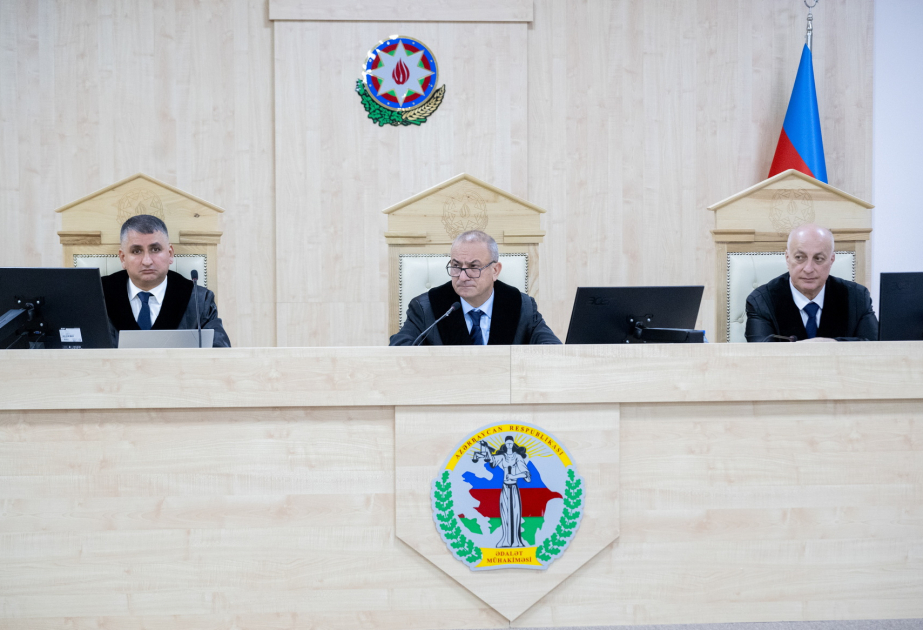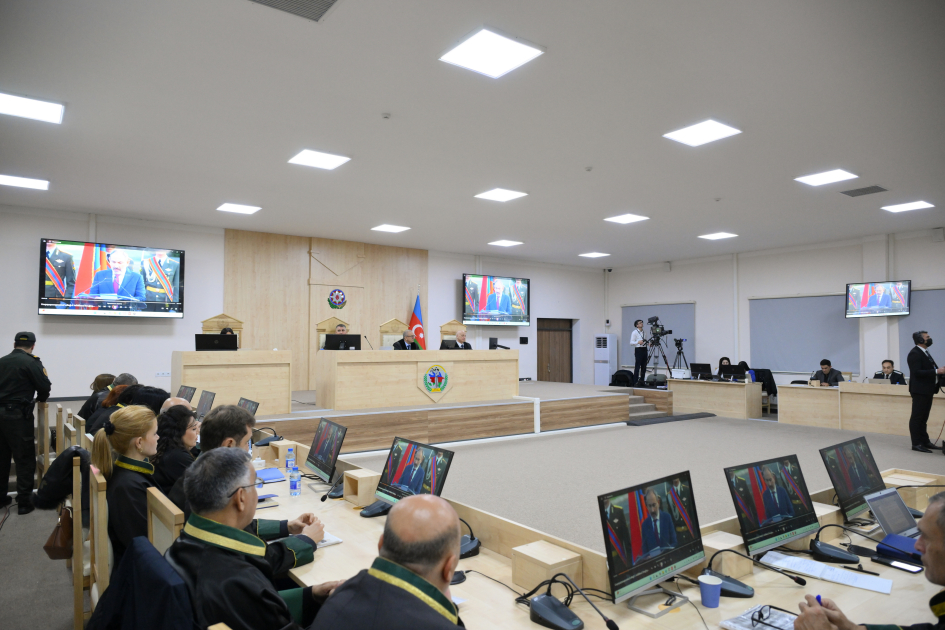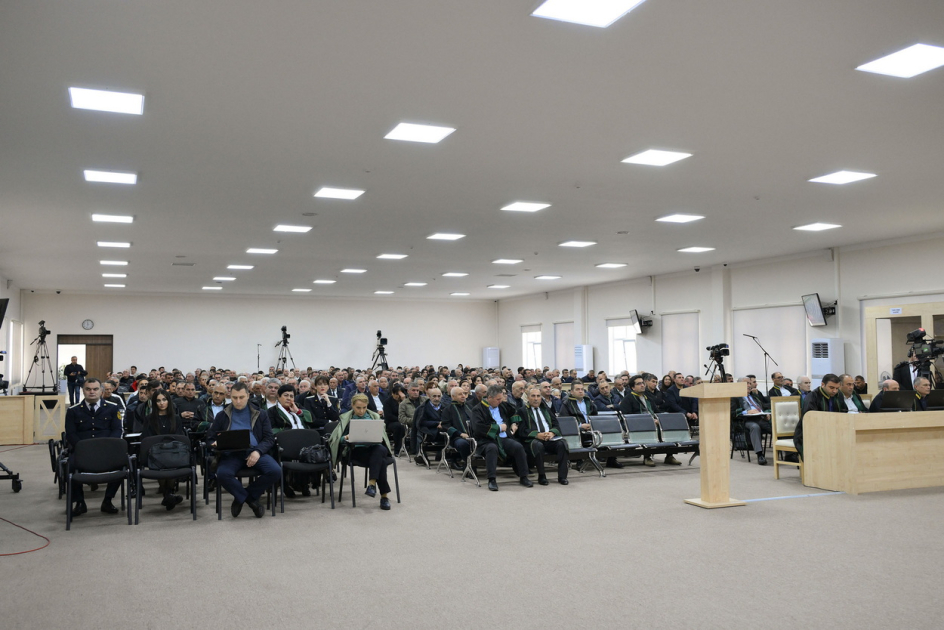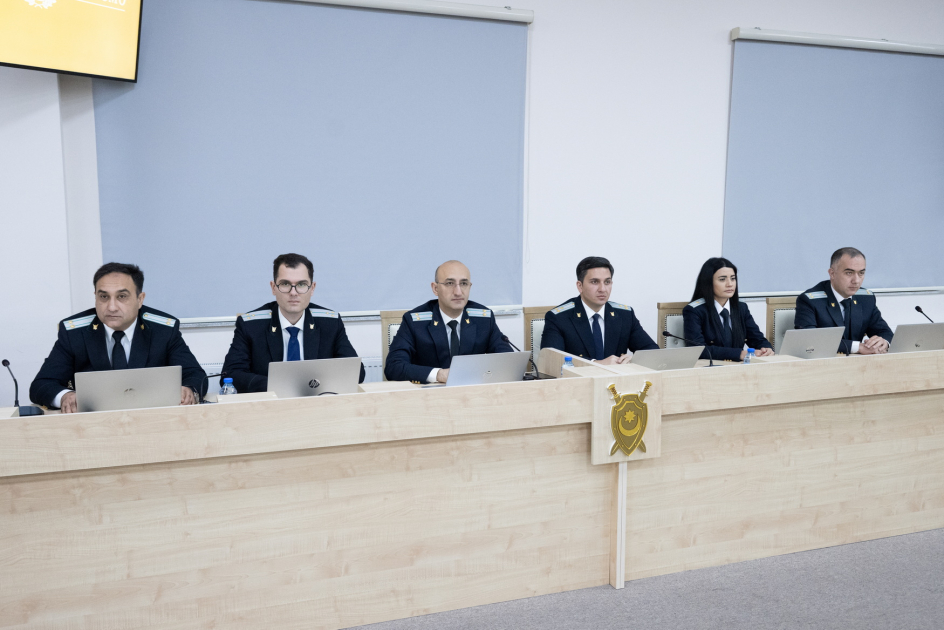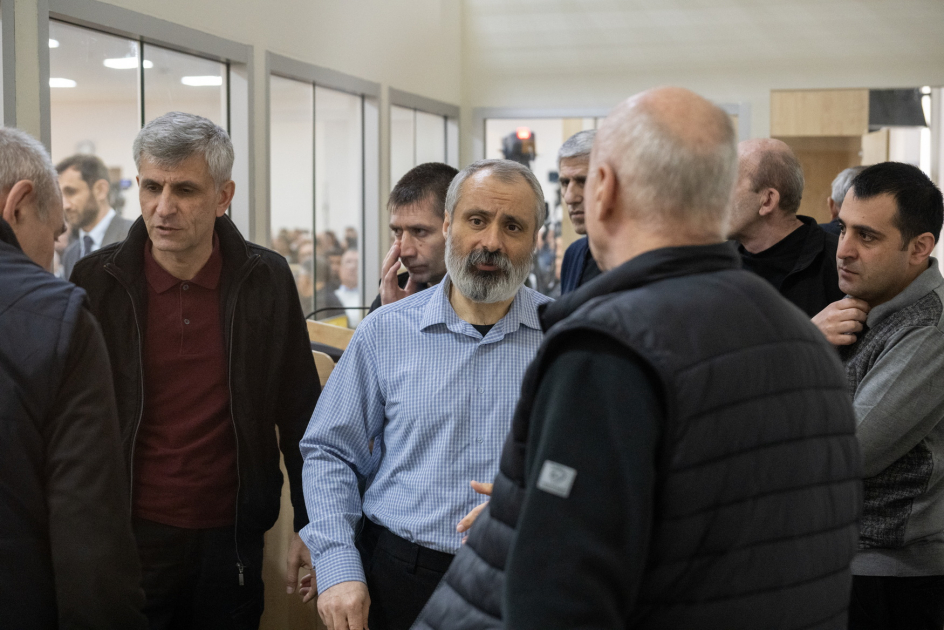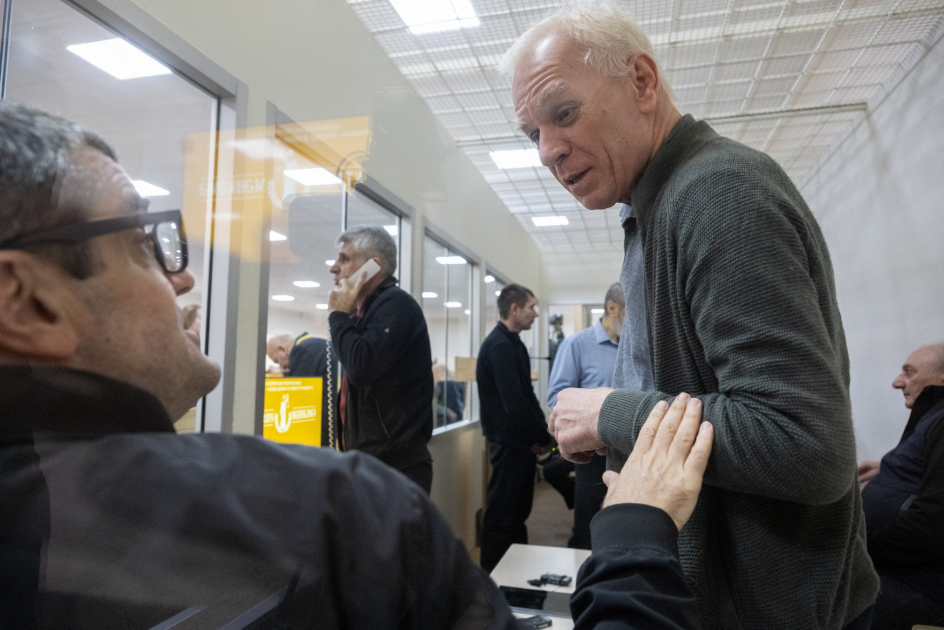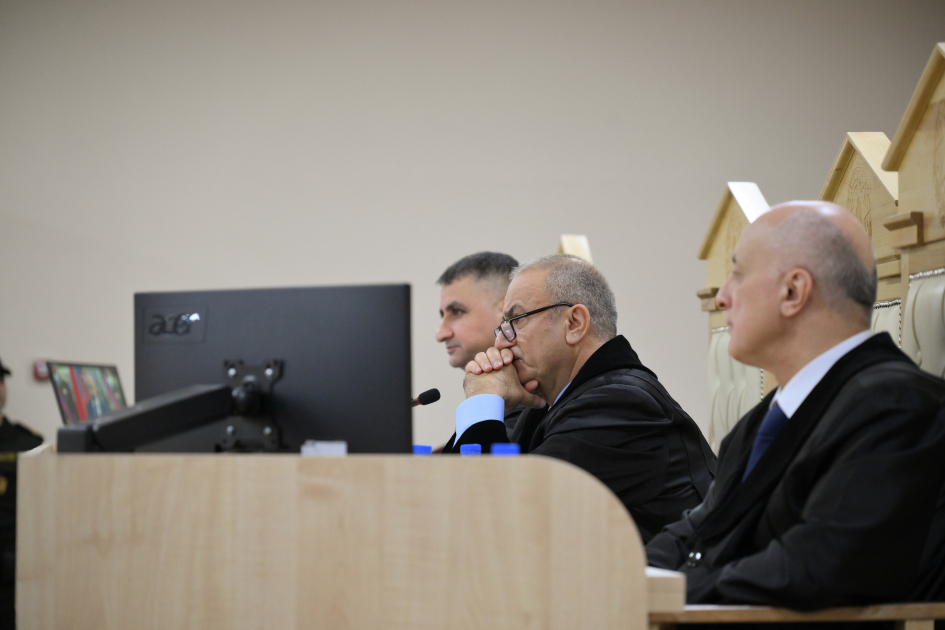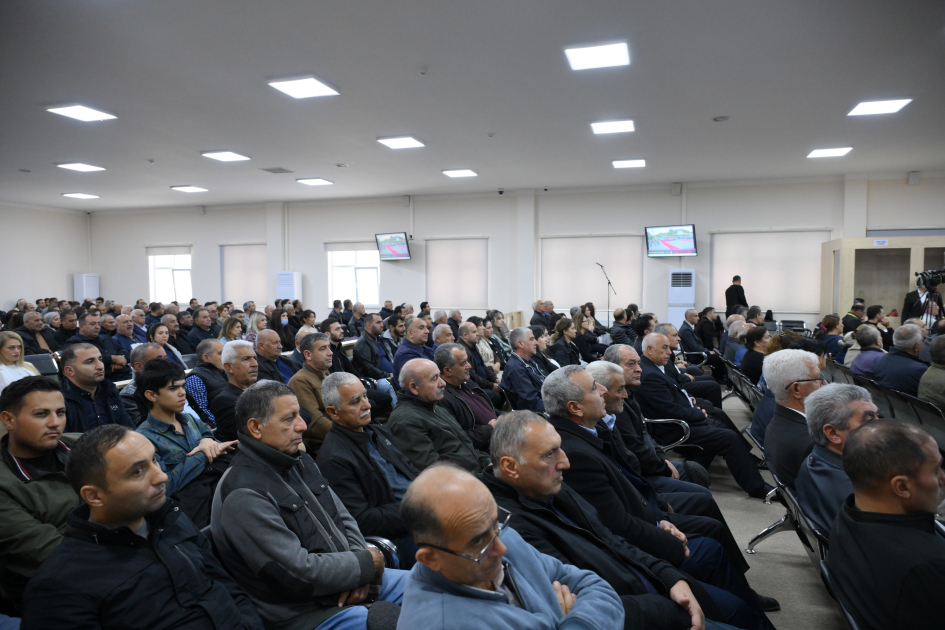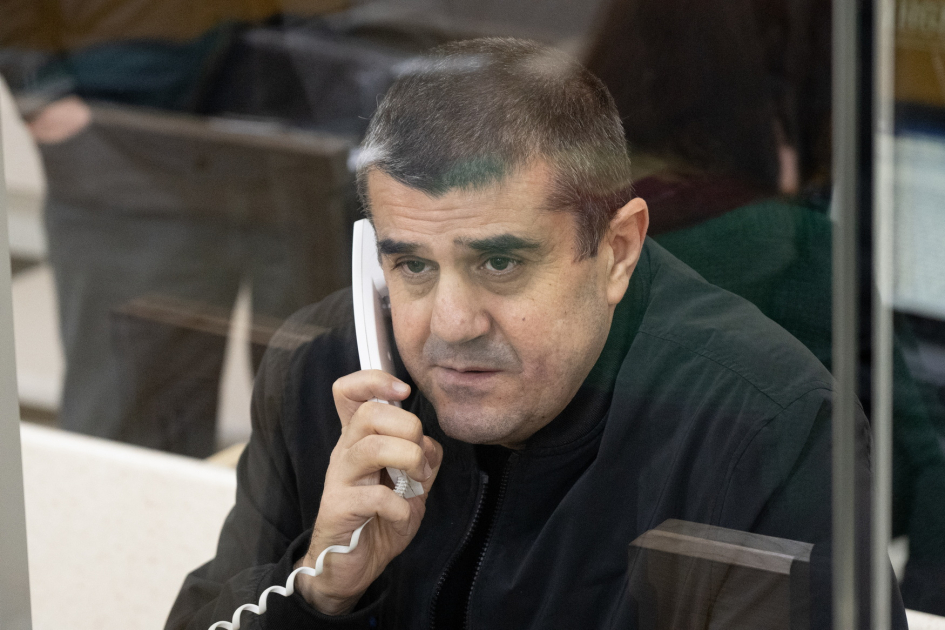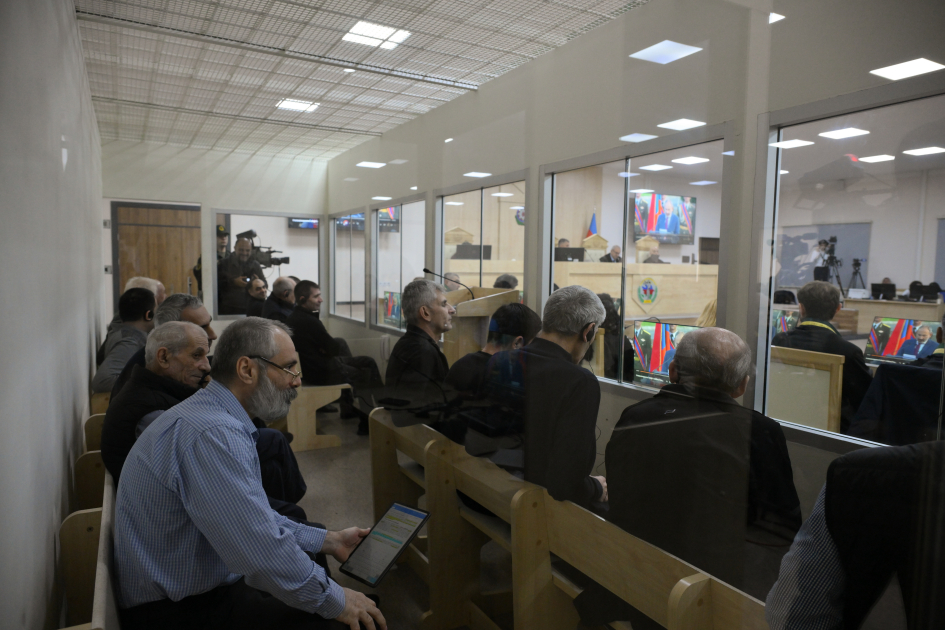BAKU, Azerbaijan, October 30. The open court session regarding criminal cases against citizens of the Republic of Armenia—accused of crimes against peace and humanity, war crimes, including the preparation and conduct of aggressive war, genocide, violation of the laws and customs of war, as well as terrorism, financing of terrorism, forcible seizure of power, forcible retention of power, and numerous other crimes resulting from Armenia's military aggression against Azerbaijan— Arayik Harutyunyan, Arkadi Ghukasyan, Bako Sahakyan, Davit Ishkhanyan, David Babayan, Levon Mnatsakanyan, and others, continued on October 30, Trend reports.
The court session, held at the Baku Military Court under the chairmanship of Judge Zeynal Aghayev, with a panel consisting of Jamal Ramazanov and Anar Rzayev (reserve judge Gunel Samadova), ensured that each accused person was provided with an interpreter in their native language, as well as lawyers for their defense.
The session was attended by the accused individuals, their defenders, a portion of the victims, their legal heirs and representatives, as well as state prosecutors.
Presiding Judge Zeynal Aghayev stated that a number of victims had applied to the court with a petition, indicating that they would be unable to participate in the court proceedings, confirming their statements given during the initial interrogation, and requesting that they be announced.
The parties did not object to the announcement of those statements in court.
Thereafter, the court continued with the examination of additional evidence submitted by the defense to the court.
During the court session, based on the petition of the accused Davit Ishkhanyan, a video material recorded after the 2020 Tovuz events (Tovuz battles—ed.) was examined.
Recall that on October 24, during the court session, Ishkhanyan's lawyer had petitioned for the examination of that video.
The video, uploaded to the "YouTube" social network on August 28, 2020, was displayed. In the video material, Armenian Prime Minister Nikol Pashinyan awards Armenian soldiers in Sardarapat. At the event, attended by Arayik Harutyunyan, Nikol Pashinyan stated that all those awarded were active participants in the July battles.
State prosecutor Vusal Abdullayev addressed questions to the accused Arayik Harutyunyan. First, it was noted that in the video, Armenian soldiers who participated in the July battles are being awarded. "For what purpose and in what capacity were you invited to that event? On June 19, 2020, a joint Security Council meeting of the Republic of Armenia and the puppet regime was held. What was the purpose of your participation? You stated during the court interrogation that the July battles had no connection to the puppet regime. What necessity led to this meeting, and what issues were discussed?" the state prosecutor asked.
In his response, the accused stated that representatives of the puppet regime were always invited to such events held in the Republic of Armenia. At the meeting, issues related to the security of the Republic of Armenia, the readiness of the army, and possible war scenarios were discussed.
The next document examined was an interview given by the accused Levon Mnatsakanyan in Shusha on the Jidir Duzu plain to an Armenian journalist. He stated in court that he did not mention any figures regarding the loss of 400 servicemen from the "Yashma brigade" (referring to Azerbaijan's Special Forces—ed.) in the interview. Upon re-examination of the video, it was determined that Mnatsakanyan, in response to the journalist's question, said: "The 'Yashma brigade' has losses close to 400."
After re-watching that part of the interview during the court session, Mnatsakanyan claimed that he did not say such words.
Following this, material submitted to the court by the defender of the accused Bako Sahakyan, Nigar Mirbabayeva, was displayed.
This was an article published online on December 1, 2020, regarding the activities of Arkadi Ghukasyan and Bako Sahakyan during the Patriotic War. The material was examined with the participation of the parties.
Thereafter, the presiding judge announced a letter sent by the State Commission on Prisoners of War, Hostages and Missing Persons of the Republic of Azerbaijan to the Investigation Department of the Prosecutor General's Office.
The letter indicates that, based on information gathered by the Commission, during the First Karabakh War resulting from Armenia's military aggression against Azerbaijan, 54 Azerbaijani citizens who were captives and hostages were visited in places of detention in Armenia and the territories it occupied by the International Committee of the Red Cross in 1992–1996.
Subsequently, although the remains of 17 out of those 54 were returned, 37 were forcibly disappeared by Armenian armed forces. No information was provided at all about the subsequent fate of 4 out of the 37. Although it was reported that 33 died in places of detention, their remains were not returned.
Information compiled regarding the records was also announced in court. That information notes that on January 29, 1994, 8 Azerbaijani captives and hostages were killed.
Following this, Tugay Rahimli, Assistant to the Prosecutor General for Special Assignments, requested the examination of a portion of an international organization's report. The examined document indicates that the incident involving the deaths of 8 captives in Yerevan, Armenia, in 1994 was particularly horrific. At the time the article was written, the cause of their deaths remained unknown.
Addressing the court, Tugay Rahimli stated that the accused Bako Sahakyan had emphasized in interrogation materials that he had been involved in issues related to captives and hostages at one time. Rahimli asked the accused: "On January 29, 1994, 8 captives and hostages were killed. Do you have any information regarding this?" He added that the captives and hostages were killed on the same day, in the same place. This cannot be coincidental.
Sahakyan stated that he has no information regarding the incident indicated in the report.
Following this, during the court session, statements from the victims and the legal heirs of the victims were announced.
In the statement of victim Shukurov Mahmud Sabir oglu, it was reported that on September 13, 2022, in the territory of Zangilan district, Farid Rustamov was killed as a result of the explosion of a hand grenade thrown by the enemy, while he, Farid Mammadov, Saleh Hasanov, and Tabriz Ramazanov sustained bodily injuries.
The legal heir of victim Alakbarli Kenan Mushfig oglu, Alakbarova Fakhriyya Khalil gizi, stated in her testimony that on October 10, 2020, she received the news that her son had been martyred in the direction of Sugovushan village of Tartar district.
Based on the statement of Babirli Asif Oktay oglu, as a result of fire opened by Armenian armed forces on the territory of Goygol district on September 28, 2020, he, Elvin Salimov, Kamran Huseynov, Rashad Novruzov, Mustafa Mammadov, and Rashad Abdullayev were wounded, while Orxan Dashdemirov was killed.
Victim Mammadov Mail Mahammadali oglu stated in his testimony that on October 21, 1992, in Sirkhavend village of Aghdara district, he was taken captive by soldiers of the Armenian armed forces. First taken to Hadrut settlement and then, subjected to torture en route in a "URAL" military vehicle, he was brought to Khankendi city. There, in a special-regime isolation facility where he was held, he was subjected to various tortures. Later, he was held in the basement of another building. During the 3 months he spent in captivity in Khankendi city, Colonel Basensi Azoyan, Lieutenant Colonel Artur Simonyan, and Sergey Abramyan—Armenian officers—interrogated him and subjected him to repeated tortures in the cells where he was held.
Based on the announced statement of victim Aliyeva Malahat Ahmad gizi, born in 1957 and a resident of Khojaly town, on February 25, 1992, Armenian armed forces besieged Khojaly town, shot at the population, and set fire to the town. She, her husband Tapdig Chobanov, son Teymur (born 1979), son Seymur (born 1980), and daughter Nezakat (born 1984) also left the town together with the community. "On the snowy road, ears were deafened by the cries and wails of women and children," she noted in her statement.
Armenian armed forces opened fire on people on the road to Aghdam, killing a large number of civilians. In the gunfire, Tapdig clutched his stomach and fell to the ground, while Nezakat, in his arms, was shot and died. Although she herself was wounded in the leg, she held her sons' hands and continued moving. The surroundings were filled with the bodies of numerous women, children, and elderly people. Her other relatives were also murdered.
Victim Garayev Jabrayil Khasay oglu stated in his testimony that on July 20, 1993, during an attack on Giyasli village of Aghdam district where he lived, he was taken hostage by soldiers of the Armenian armed forces. He was held first in Yetim Jinli village of Aghdam, then in a military unit in Khankendi city, and later in Shusha prison. During his captivity, he was regularly beaten, kept hungry and thirsty for long periods on the cold concrete floor, and subjected to tortures and ill-treatment.
Victim Mammadov Vahid Abasgulu oglu stated in his testimony that he was working on the railway in Meghri district of Armenia. On December 6, 1991, while intending to have lunch in the area called Meghri River with brigade leader Gardashov Etibar Farman oglu, operator Javadov Fazil Agha oglu, operator assistant Nabiyev Javad Gurban oglu, laborers Rahimov Valeh Mirsadig oglu, Heydarov Tofig Sadig oglu, Yusifzade Badal Hashim oglu, Gubadov Etibar Anvar oglu, and Mammadov Mahammadhuseyn Jafargulu oglu, they were taken hostage by Armenian soldiers armed with automatic weapons. They were thrown into a room with iron bars in Gajaran town and looted there. Along with Badal Yusifzade and Etibar Gardashov, he was held in an unidentified mountain village, then in Gafan district. During his captivity, he was subjected to tortures, inhumane, and ill-treatment.
The court session continued with the reading of other statements.
The court proceedings will continue on October 31.
Fifteen defendants of Armenian origin are accused in the criminal case concerning numerous crimes committed during the aggressive war waged by the Armenian state - including the aforementioned criminal association - on the territory of Azerbaijan, in violation of domestic and international legal norms. These crimes were committed for the purpose of military aggression against Azerbaijan and were carried out under the direct leadership and participation of the Armenian state, officials of its state institutions, its armed forces, and illegal armed formations, through their written and verbal orders, instructions, and guidelines; material, technical, and personnel support; centralized management; as well as under strict control and under the leadership and direct or indirect participation of Robert Sedraki Kocharyan, Serzh Azati Sargsyan, Vazgen Mikaeli Manukyan, Vazgen Zaveni Sargsyan, Samvel Andraniki Babayan, Vitali Mikaeli Balasanyan, Zori Hayki Balayan, Seyran Musheghi Ohanyan, Arshavir Surenovich Garamyan, Monte Charles Melkonyan, and others.
The following individuals - Arayik Vladimiri Harutyunyan, Arkadi Arshaviri Ghukasyan, Bako Sahaki Sahakyan, Davit Rubeni Ishkhanyan, David Azatini Manukyan, Davit Klimi Babayan, Levon Henrikovich Mnatsakanyan, Vasili Ivani Beglaryan, Erik Roberti Ghazaryan, Davit Nelsoni Allahverdiyan, Gurgen Homeri Stepanyan, Levon Romiki Balayan, Madat Arakelovich Babayan, Garik Grigori Martirosyan, and Melikset Vladimiri Pashayan - are being charged under the following articles of the Criminal Code of the Republic of Azerbaijan: Article 100 (planning, preparing, initiating, and waging a war of aggression); Article 102 (attacking persons or organizations enjoying international protection); Article 103 (genocide); Article 105 (extermination of the population); Article 106 (enslavement); Article 107 (deportation or forced displacement of population); Article 109 (persecution); Article 110 (enforced disappearance of persons); Article 112 (deprivation of liberty contrary to international law); Article 113 (torture); Article 114 (mercenary service); Article 115 (violation of the laws and customs of warfare); Article 116 (violation of international humanitarian law during armed conflict); Article 118 (military robbery); Article 120 (intentional murder); Article 192 (illegal entrepreneurship); Article 214 (terrorism); Article 214-1 (financing terrorism); Article 218 (creation of a criminal organization); Article 228 (illegal acquisition, transfer, sale, storage, transportation, and possession of weapons, ammunition, explosives, and devices); Article 270-1 (acts threatening aviation security); Article 277 (assassination of a state official or public figure); Article 278 (forcible seizure and retention of power, forcible change of the constitutional structure of the state); Article 279 (creation of armed groups not provided for by law); and additional articles.

